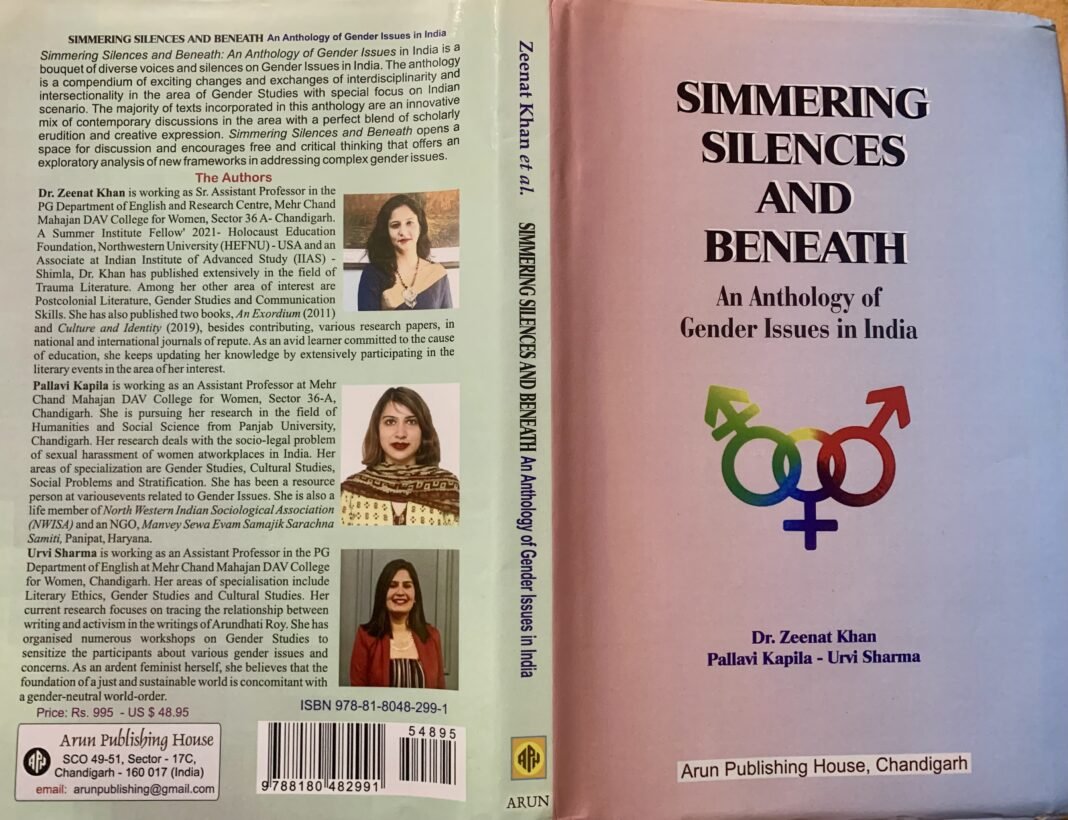By: Dr. Ratan Bhattacharjee
“It is time that we all see gender as a spectrum instead of two sets of opposing ideals”, said Emma Watson and this newly published book on gender issues in India throws a challenge to grand theories related to Feminism Culture does not make people. People make culture. If it is true that the full humanity of women is not our culture, then we can and must make it our culture. But what we need is a rich understanding of the heterogeneity of human experiences thus inviting the discussion of new perspectives and conceptual frameworks as we find in Simmering Silences and Beneath: An Anthology of Gender Issues in India edited by three renowned academicians Dr. Zeenat Khan, Pallavi Kapila and Urvi Sharma.
The book aims to provide a solid foundation for countering the conventional interpretive approaches that often reinforce gender hierarchies and inequalities to pave way for new conceptual approaches and frameworks that will decide the future of Gender Studies. Prof Urvi Sharma emerges in this book not only as one of the editors but also as an organizer who chases the scholars for papers and took the big initiative to make the study of Gender more profound and diverse. Her Paper ‘Coming out and Leaving the Closet Behind’ itself reveals her vision for making academic frameworks and the future of gender studies. She rightly concludes, “Today, gender has materialized as a designation that is almost meaningless – especially over the last twenty years as the study of gender has become more prominent in college classrooms and the basis of much research, writing, art teaching, and activism across the world.” We may agree with her that in Indian academia, the goal of Gender Studies is not one of gender blindness; the goal instead is to deinstitutionalize gender, a long and arduous process that first requires us to see through the seductive descriptions of men and women offered by domesticity.
The book consists of a total of thirteen chapters and each one is contributed by eminent academicians who specialized in gender studies. Some chapters deal with very thinking such as on the impact of HIV or AIDS on the transgender community as Dr. Jagdish Mehta HoD of Dept of Sociology DAV college did it in the second chapter while Dr. Kauser Tasneem of Karim City College made a scholarly analysis of the intersectionality of caste and gender victims, violence and the matrix of power. The term ‘intersectionality was coined in 1989 by Professor Kimberlie Crenshaw about the Black Women for describing the overlapping of race, class, and gender in creating a compounding experience of oppression. It is an intelligent application of Dr. Tasneem to the discrimination faced by Dalit women. Social dialogue is important for improving the system structure and experiences that define the multiple axes of power within Indian society. This is the subject of one chapter in the book.
The concept of ‘Womanism’ in Alice Walker’s concept of Western middle-class feminism is contrasted with Indian feminism which is not a monolithic category. This chapter written by Dr. Sunaina Jain brings into the discussion Dalit feminists like Meena Kandasamy and Pradnya Daya Pawar as well as celebrity actress cum poet Kalki Koechlin and Laxmi Agarwal who was herself an acid attack victim- turned social activist. Pallabi Maji and Dr. Arindam Modak from the National Institute of Technology in Durgapur analyze different perspectives of the commodification of the female body in the Bollywood item songs. It is a well-known fact that Bollywood representations of women are dictated by patriarchal values and in this chapter, the gender bias is traced back. Prof Pallavi Kapila of Mehr Chand Mahajan DAV College for Women analyzed the concept of sex as differentiated and opposed from the social construct of gender in society.
Another dimension is added by the exploration of the struggles of the ordinary people who are stuck in the perpetual cycle of poverty and this is no less linked to the discussion of gender equality. Similarly, the trauma of partition which induced sexual violence and is restricted by silence suits the patriarchal society’s definition of a good woman. Research scholars like Parvathi Chandrasekharan Nair, Debasmita Mahajan, Rutuja Pradhan or Sayantani Sengupta, or Paulami Sengupta did brilliant contributions to the discourse. This is a big dream and a grand vision that the edited book brilliantly explores in diverse ways. Aristotle declared that the ‘female is female under a certain lack of qualities’ and St. Thomas Aquinas believed that woman is an ‘imperfect man’. This new book throws a big challenge to such structured ideas. The book is a single step for three editors but a big leap for the academic world. (The author is a Senior Associate Professor & HoD of Post Graduate Dept of English and a trilingual Poet cum Columnist. He can be reached at profratanbhatacharjee@gmail.com)



